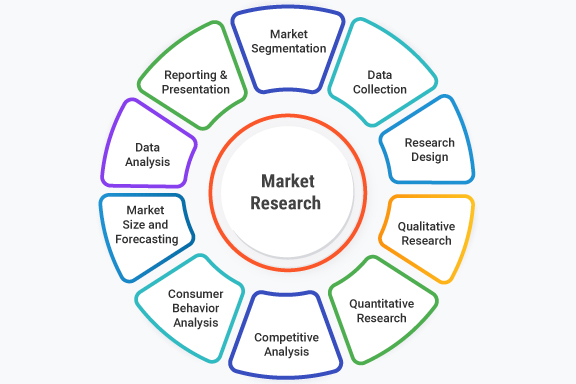In today’s dynamic business environment, understanding market dynamics is crucial for success. The market research process serves as a cornerstone for businesses to comprehend consumer preferences, market trends, and competitors’ strategies.
Importance of Market Research Process

Market research empowers businesses with valuable insights to make informed decisions. It aids in identifying opportunities, mitigating risks, and optimizing marketing strategies. By understanding consumer behavior and market trends, businesses can stay competitive and adapt to changing market conditions effectively.
Understanding the Market Research Process
1. Defining Objectives
The first step in the market research process is to clearly define objectives. Whether it’s launching a new product, expanding into new markets, or understanding customer satisfaction, defining precise objectives is essential.
2. Data Collection Methods
Once objectives are established, various data collection methods are employed. These methods may include surveys, interviews, observations, and secondary research. Each method offers unique advantages and helps gather diverse perspectives.
3. Data Analysis Techniques
After collecting data, rigorous analysis is conducted to derive meaningful insights. Data analysis techniques such as statistical analysis, regression analysis, and data visualization are utilized to uncover patterns, trends, and correlations within the data.
Steps in the Market Research Process
1. Identifying the Problem
Identifying the problem is the foundation of the market research process. It involves understanding the business challenge or opportunity that necessitates research.
2. Designing the Research Plan
Once the problem is identified, a research plan is crafted. This plan outlines the research objectives, methodology, target audience, and timeline for data collection and analysis.
3. Data Collection
Data collection involves gathering relevant information using chosen methods and tools. Whether through surveys, focus groups, or market analysis, collecting accurate and reliable data is paramount.
4. Analysis and Interpretation
After data collection, thorough analysis and interpretation are conducted to extract meaningful insights. This phase involves identifying patterns, trends, and relationships within the data.
5. Reporting Findings
The final step is to compile and report research findings. A comprehensive report prepared, highlighting key insights, recommendations, and actionable strategies based on the research outcomes.
Market Research Tools
Market researchers leverage a variety of tools and techniques to gather and analyze data effectively. These may include online survey platforms, data analytics software, and market intelligence databases.
Challenges
Despite its importance, market research poses several challenges. These may include budget constraints, data quality issues, sample bias, and evolving consumer preferences. Overcoming these challenges requires strategic planning, innovative approaches, and continuous refinement of research methodologies.
Conclusion
In conclusion, the market research process is instrumental in guiding strategic decision-making and enhancing business performance. By understanding consumer needs, market dynamics, and competitive landscapes, businesses can gain a competitive edge and drive sustainable growth. Are you ready to unlock the power of market research for your business? Request a demo from AIM Technologies today!
FAQs
What is the role of market research in business?
- Market research helps businesses understand consumer preferences, market trends, and competitors’ strategies, enabling informed decision-making.
How does market research benefit startups?
- For startups, market research provides insights into market opportunities, target audiences, and competitive landscapes, helping mitigate risks and optimize resources.
What are the common challenges in conducting market research?
- Challenges in market research include budget constraints, data quality issues, sample bias, and evolving consumer preferences.
How often should market research be conducted?
- Market research conducted regularly to stay updated on changing market dynamics, consumer behavior, and industry trends.
What are some cost-effective market research methods for small businesses?
- Small businesses can leverage online surveys, social media analytics, and competitor analysis tools as cost-effective market research methods.




